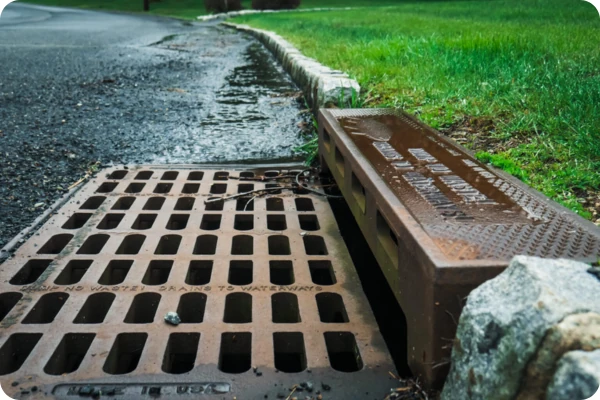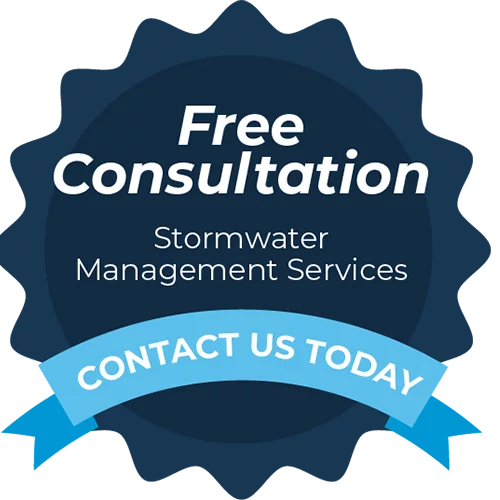When it comes to managing stormwater runoff in urban and suburban environments, Municipal Separate Storm Sewer Systems (MS4s) play a critical role in protecting water quality and preventing pollution. Property managers, developers, and municipalities need to understand how these systems function, why they matter, and what responsibilities come with maintaining compliance.

What Is an MS4?
A Municipal Separate Storm Sewer System (MS4) is a drainage system designed to collect and convey stormwater runoff through a network of catch basins, storm drains, pipes, and ditches, discharging untreated runoff directly into local water bodies. Unlike a combined sewer system, which transports both sewage and stormwater to a treatment facility, MS4s handle only stormwater, making them highly susceptible to carrying pollutants such as oil, sediment, and trash into rivers, lakes, and streams.
Key Components of an MS4
- Catch Basins: Collect stormwater from streets and direct it into underground pipes.
- Storm Drains: Convey collected water to downstream systems.
- Culverts and Channels: Control the flow of stormwater to prevent flooding.
- Outfalls: Discharge stormwater into receiving water bodies.
Why MS4s Are Important
MS4s serve as the first line of defense in reducing pollution in stormwater runoff. By managing runoff effectively, they prevent contaminants from entering nearby ecosystems, protecting aquatic life and ensuring the health of local communities.
Environmental Protection
Stormwater runoff often carries pollutants, including:
- Sediment: Increases turbidity, impacting aquatic habitats.
- Nutrients: Excess nitrogen and phosphorus can cause algal blooms.
- Heavy Metals: Toxic to fish and other wildlife.
Flood Prevention
Properly maintained MS4s prevent localized flooding by channeling stormwater efficiently away from developed areas. Without effective stormwater management, heavy rains can overwhelm drainage systems, leading to costly property damage.
Regulatory Compliance
Municipalities with MS4s are required to comply with the Clean Water Act’s National Pollutant Discharge Elimination System (NPDES) permit program. Failure to comply can result in violations, fines, and reputational damage for communities and property owners.
MS4 Permit Phases
The Environmental Protection Agency (EPA) classifies MS4s into two categories based on population size and system complexity:
Phase I MS4s
Established in 1990, Phase I applies to large and medium municipalities that serve populations of 100,000 or more. These systems require detailed stormwater management programs (SWMPs) that include:
- Public education and outreach
- Illicit discharge detection and elimination
- Construction site runoff control
- Post-construction stormwater management
Phase II MS4s
Implemented in 1999, Phase II targets smaller municipalities and entities, requiring the development of a more streamlined stormwater management plan with six minimum control measures (MCMs):
- Public Education: Informing the public about stormwater impacts
- Public Involvement: Encouraging community participation
- Illicit Discharge Detection: Identifying and eliminating illegal discharges
- Construction Runoff Control: Managing pollutants from construction sites
- Post-Construction Stormwater Management: Ensuring long-term water quality
- Pollution Prevention and Good Housekeeping: Reducing contamination from municipal operations
Common MS4 Challenges
Managing an MS4 can be complex due to several challenges, including:
Illicit Discharges
Illicit discharges, such as illegal dumping or improper connections, can introduce pollutants into the stormwater system. Regular inspections and prompt corrections are essential to maintaining compliance.
Sediment and Erosion Control
Construction activities often increase sediment in runoff, impacting water quality. Implementing best management practices (BMPs) during and after construction reduces sediment load.
Aging Infrastructure
Outdated stormwater systems may struggle to meet current demands, making upgrades and regular maintenance necessary to prevent failures and ensure regulatory compliance.
Best Practices for MS4 Compliance
Maintaining compliance with MS4 permits requires a proactive approach. Consider implementing the following best practices:
Develop a Comprehensive Stormwater Management Plan (SWMP)
A well-structured SWMP outlines procedures for controlling stormwater discharge and includes monitoring, maintenance, and public engagement strategies.
Conduct Regular Inspections and Maintenance
Routine inspections ensure that catch basins, storm drains, and outfalls remain free of debris and function effectively. Periodic maintenance helps prevent costly system failures.
Engage in Public Education and Community Involvement
Educating local communities about stormwater pollution and encouraging responsible practices can significantly reduce illicit discharges and pollutant loads.
Implement Green Infrastructure Solutions
Integrating green infrastructure, such as permeable pavements, bioswales, and rain gardens, can enhance stormwater infiltration and improve overall system efficiency.
How iSTORMWATER Supports MS4 Compliance
At iSTORMWATER, we specialize in helping municipalities, property managers, and contractors navigate the complexities of MS4 compliance. Our services include:
- Stormwater Inspections and Compliance Audits: Identifying and addressing issues before they escalate
- Erosion and Sediment Control: Implementing BMPs to minimize pollutant discharge
- Stormwater System Design and Maintenance: Ensuring systems operate effectively year-round
Ready to Ensure MS4 Compliance?
Contact iSTORMWATER today at (410) 231-3455 to learn how we can assist with your MS4 management and compliance needs.
Understanding and managing Municipal Separate Storm Sewer Systems (MS4s) is essential for protecting water quality, preventing flooding, and staying compliant with regulatory requirements. Whether you manage a large urban system or a smaller community’s infrastructure, maintaining MS4 compliance ensures healthier ecosystems and safer communities. By implementing best practices and seeking professional support, property managers and municipalities can safeguard their stormwater systems and contribute to a sustainable future.
Real Results
iStormwater LLC was an excellent choice. They made the process of the Stormwater pond repairs seamless. They took charge of the project and got the project approved and passing the inspection. We highly recommend them and would use them again.
Incredible stormwater management service. The owner John consulted on a property I manage and ended up saving us thousands of dollars in environmental fees from the government. Now, our property is compliant with the EPA and we have a great partner to keep us maintained on stormwater regulations over time.
So helpful with all of my water issues.
Great communication and leadership and a family friendly atmosphere. Thank you John!
Stormwater and wastewater are often mentioned together, but they serve very different roles in protecting infrastructure, waterways, and regulatory compliance. For property managers, facility owners,...
- Annapolis
- Anne Arundel County
- Baltimore County
- Baltimore
- Bel Air South
- Bethesda
- Bowie
- Cecil County
- Charles County
- Columbia
- Gaithersburg
- Glen Burnie
- Howard County
- Montgomery County
- Pasadena
- Prince George’s County
- Rockville
- Severna Park
- St. Mary’s County



